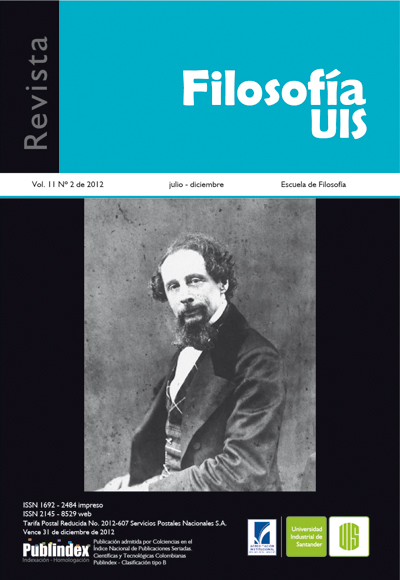Hegel’s contributions to the contemporary discussion about civil society
Published 2012-12-21
Keywords
- dialectic,
- ethics,
- the beyond,
- civil society,
- overcoming
How to Cite
Copyright (c) 2012 Carlos Jesús Molina Ricaurte

This work is licensed under a Creative Commons Attribution 4.0 International License.
Abstract
In Hegel’s work, we see how, for the first time as the problems of thought are set as a reflection of the problems of reality. Indeed, for Hegel, a correct understanding of reality must be based on an understanding of the subject itself in the midst of that reality. Civil society involves a complex issue in relation with philosophy. Itself has some internal contradictions. Therefore we should consider something beyond civil society, not only to overcome its own contradictions, but also to preserve the individuals’ particularity she has spawned.
Downloads
References
- Deleuze, G. (1997). Crítica y clínica. Barcelona: Anagrama.
- Deleuze, G. (1999). ¿Qué es la filosofía? Barcelona: Anagrama.
- Derrida, J. (1998). Adiós a Emmanuel Lévinas. Palabra de acogida. Madrid: Trotta.
- Hegel, G. W. F. (1971). Fenomenología del espíritu. México: Fondo de Cultura Económica.
- Hegel, G. W. F. (1993). Fundamentos de la Filosofía del Derecho. Madrid: Libertarias-Prodhuri.
- Knowles, D. (2002). Routledge Philosophy Guidebook to Hegel and the Philosophy of Right. New York: Routledge.
- Lukács, G. (1970). El joven Hegel y los problemas de la sociedad capitalista. México: Grijalbo.
- Papaioannou, K. (1975). Hegel. Madrid: EDAF.
- Platón (2008). Critón; El Político. Madrid: Alianza.
- CIBERGRAFÍA
- Ávila, M. (2011). ”En torno a la sentencia de Anaximandro. Dos interpretaciones sobre la justicia”. Tomado de: Universitas Philosophica (56). pp. 61-83. Recuperado de: http://www.javeriana.edu.co/revistas/Facultad/filosofia/uniphilo/pdf/56/61-83. pdf. Consultado el 02/09/2012.
- Church, J. (2010). ”The Freedom of Desire: Hegel’s Response to Rousseau on the Problem of Civil Society”. Tomado de: American Journal of Political Science. Volumen 54, (1), pp. 125-139.Recuperado de: DOI: 10.1111/j.1540-5907.2009.00422.x Consultado el 02/09/2012.
- Díaz, J. (2009). ”Lo absoluto del saber absoluto”. Tomado de: Eidos. (11) pp.10- 34. Recuperado de: http://rcientificas.uninorte.edu.co/index.php/eidos/article/view/1346/872. Consultado el 02/09/2012).
- Rocha, D. (2010). “Pensar el porvenir. La disyunción futuro/porvenir en la deconstrucción de J. Derrida”. Tomado de: Daímon. Revista Internacional de Filosofía. (Suplemento 3), pp. 117-123. Recuperado de: http://revistas.um.es/daimon/article/viewFile/119091/112231. Consultado el 02/09/2012.
